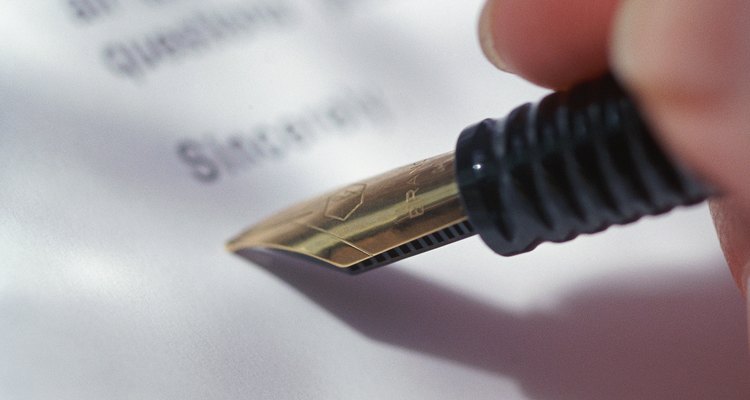
Stockbyte/Stockbyte/Getty Images
An alcoholic amends letter is based on step nine of the Alcoholics Anonymous 12-step program. Grounded in faith and personal responsibility, the program helps alcoholics learn to achieve and maintain sobriety. If you currently have a sponsor and membership in an AA group, consider working together to write your amends letters.
Understanding Step Nine
In step eight, you make a list of the people you harmed and become willing to make amends. In step nine, you make direct amends to those people, unless it would be more harmful to do so. When you stopped drinking, you stopped the behaviors that caused harm. Yet that is not enough. Neither is simply apologizing without the true intention to change. This involves praying or meditating for guidance, accepting responsibility for your actions, repaying debts and asking for forgiveness.
Explaining Why
Begin your letter with a brief explanation of why you are writing. It is appropriate to disclose that you are an alcoholic and are working your way through the 12 steps of AA. Explain that the program requires you to do your best to fix your past mistakes in order to move forward with recovery. Keep your focus on AA rather than yourself to avoid the appearance of blaming your alcoholism or seeking sympathy.
Accepting Responsibility
Accepting responsibility is a two-fold task. You must accept responsibility for your harmful behaviors and for the words you write in the letter. It is important to think through the ways your letter might affect the recipient, according. Be willing to accept that person’s reactions, even if they are negative. Resist the temptation to tell him how he hurt you. Instead, simply recount your poor behaviors and express genuine regret.
Repaying Debts
Part of this step is the willingness to set things right. If you owe the person money, enclose as much as you can and make a commitment to make payments as you are able. If you owe an emotional debt, go out of your way to make the person feel good about herself. This portion can be difficult, especially if the debts are not financial in nature. Talk to your sponsor and your group about ways of repaying psychological or emotional debts.
Asking Forgiveness
End your letter with a sincere request for forgiveness. Explain that you have addressed your behaviors to the best of your ability, but that you know there are things you might have overlooked. Ask the recipient to let you know about any harm you have not mentioned. Encourage him to address you honestly, sharing his pain and anger. If he chooses to do so, calmly acknowledge your additional behaviors and ask forgiveness. Remember that you have no control over whether someone forgives you. Ask for forgiveness but accept that it might never come. Be prepared to move on with your life regardless of the outcome.
Related Articles

How to Make Amends for Mistakes

How to Apologize to Your Girlfriend ...

How to Say I'm Sorry for Cheating

How to Explain Something Clearly

Resolving Anger & Resentment in a ...

How to Fix a Relationship After Cheating

How to Deal With an Emotionally Abusive ...

How to Cope With Spiteful Family Members

How to Apologize for a Past Mistake on ...

How to Handle Tough Situations With ...

How to Help People Who Won't Help ...

What to Do When a Family Member Won't ...

How to Change Your Maid of Honor

How to Recover From a Narcissistic ...

How to Build Trust in Relationships ...

How to Forgive a Family Betrayal

How to Write a Letter of Remorse

How to Deal With an Alcoholic Husband

How to Ask Your Friend to Be the Best ...

How to Nicely Let Someone Know That ...
References
Writer Bio
Lisa Fritscher is a freelance writer specializing in disabled adventure travel. She spent 15 years working for Central Florida theme parks and frequently travels with her disabled father. Fritscher's work can be found in both print and online mediums, including VisualTravelTours.com. She holds a Bachelor of Arts in psychology from the University of South Florida.
Photo Credits
Stockbyte/Stockbyte/Getty Images